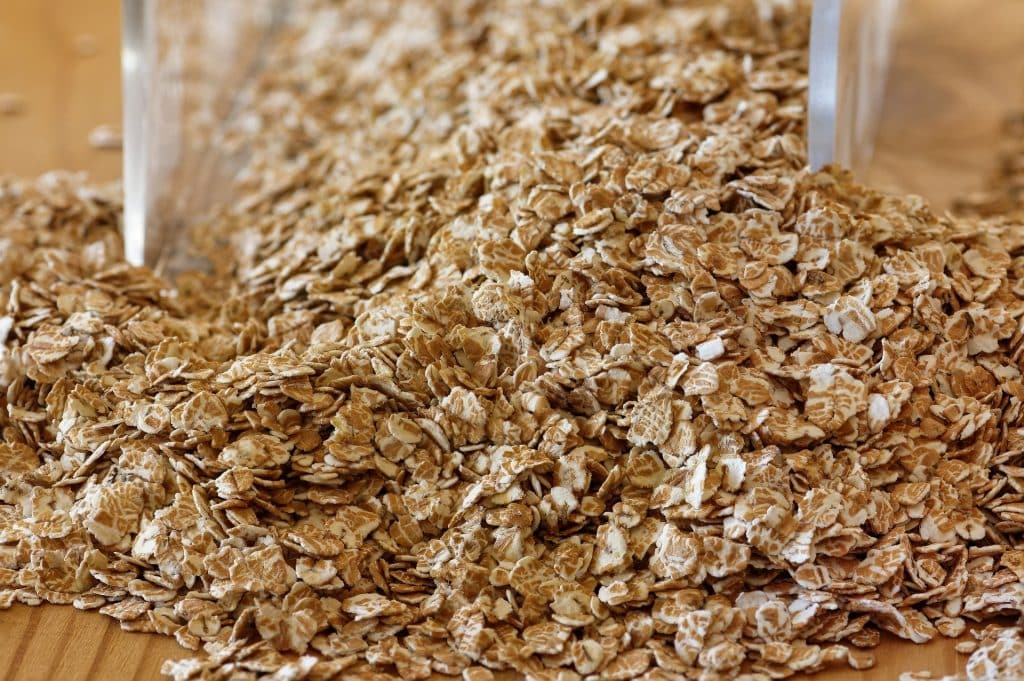Can Dogs Eat Oatmeal? A Vet’s Opinion

Oatmeal is a good source of fiber, but can you feed Oatmeal to your dog?
Dogs may eat Oatmeal if it is prepared and straightforward without additional sugar, salt, or flavors.
Benefits Of Oatmeal For Dogs
Oatmeal is a wholesome whole grain rich in nutrients and health advantages. Oatmeal’s high fiber content is one of its most important advantages. Oatmeal that has been cooked provides four grams of fiber per cup or about 16% of the daily required amount. This fiber can aid in promoting regularity in the digestive process and ease constipation. Also, fiber keeps you fuller for extended periods, which might aid weight management. The capacity of Oatmeal to decrease cholesterol is yet another significant advantage. This is made possible by beta-glucan, a form of soluble fiber abundant in oats. The risk of heart disease can be decreased by lowering blood levels of LDL, or “bad” cholesterol, which has been demonstrated to be assisted by beta-glucan. Studies have shown that oatmeal consumption lowers overall cholesterol levels by up to 5% to 10%.
Oatmeal is a fantastic source of significant vitamins and minerals, has a high fiber content, and decreases cholesterol. It includes minerals like iron, magnesium, zinc, and B vitamins like thiamine, riboflavin, and niacin. These nutrients can assist the generation of energy, good skin, and a robust immune system. They are crucial for sustaining general health. Overall, Oatmeal is a wholesome, adaptable diet with several health advantages. Blood sugar levels can be stabilized by Oatmeal, which is another benefit. Oats’ high fiber content may aid in reducing the rate at which glucose enters the system, reducing the likelihood of blood sugar peaks and valleys. For those who already have diabetes or who are at risk of getting it, this is highly crucial. Oat consumption has been linked to improved insulin sensitivity and a decreased risk of type 2 diabetes, according to many researchers.
Antioxidants, crucial for shielding the body from harm caused by free radicals, are also abundant in Oatmeal. Free radicals are unstable molecules that have the potential to harm cells and have a role in the emergence of chronic illnesses. Avenanthramides, exclusive to oats and have been demonstrated to have anti-inflammatory activities, are among the many antioxidants in oats. In addition to being a healthy food, Oatmeal is also inexpensive and simple to cook. It may be prepared in several ways, including in the microwave or on the stovetop, and it is simple to add different toppings and ingredients to make it your own. When paired with fruits, nuts, or other nutritious components, Oatmeal may make a tasty snack or dessert and a quick breakfast alternative for mornings when you’re pressed for time.
Overall, Oatmeal is a wholesome, adaptable diet with several health advantages. Oatmeal is an excellent source of fiber, has been shown to decrease cholesterol, may help maintain blood sugar levels, and may even fight free radical damage.How to Safely Give Oatmeal to Dogs?
Feeding your dog oats carefully is crucial to prevent any stomach upset or other problems. Here are some pointers on how to feed your dog oats safely:
- Use plain, cooked Oatmeal instead of flavoring, which might harm dogs. Flavored Oatmeal should also not be given to dogs. Keep to basic Oatmeal prepared in unsweetened almond milk or water.
- Oatmeal may be a nutritious supplement to a dog’s diet, but it should only be given occasionally. Oatmeal taken in excess can irritate the stomach and result in bloating gas or diarrhea.
- It’s preferable to start with a tiny quantity, like a teaspoon or two, then gradually increase the serving size over time as a general guideline.
- Avoid adding or topping things: Oatmeal shouldn’t have any toppings or additives, such as milk, honey, or sugar, since they might hurt dogs. Instead, consider flavoring the oats with a small quantity of unsweetened applesauce or mashed banana.
- While most dogs can take Oatmeal, some may be allergic or intolerant. Look for these symptoms. Keep an eye out for symptoms of gastrointestinal distress, including vomiting, diarrhea, or excessive gas, and stop using the product if they continue.
- Contact your vet: If your dog has any health issues, it’s always a good idea to speak with your physician before introducing new foods, including Oatmeal. In light of your dog’s particular requirements and current state of health, your veterinarian may assist you in deciding if Oatmeal is a secure and suitable addition to their diet.

Will Oatmeal Make A Dog Sick?
Generally, dogs are okay to consume Oatmeal, but moderation and gradual introduction are key. Dogs generally tolerate Oatmeal, although some dogs may be allergic or intolerant. Overeating Oatmeal might upset the stomach and result in bloating gas or diarrhea.
Also, it’s crucial to remember that flavored Oatmeal and Oatmeal with extra sugar, salt, or other substances are unsuitable for canines. Also, you should contact your veterinarian before introducing Oatmeal or any new food to your dog’s diet if they are already on a special diet or have a pre-existing medical problem.
In conclusion, oats benefit a dog’s diet in moderation and in the right amounts. It’s wise to keep an eye on your dog’s response to any new food, though, and to contact your veterinarian if you have any worries about their nutrition or general health.
Vet’s Summary
Given that it is a rich source of fiber, protein, and other nutrients, Oatmeal can be a beneficial supplement to a dog’s diet. To prevent stomach distress, it’s best to introduce Oatmeal gradually and in moderation. Flavored Oatmeal should also be avoided as it may contain dangerous substances. It’s better to stick to basic, cooked Oatmeal and avoid adding toppings or additives when feeding your dog. Also, it’s crucial to watch for intolerance symptoms like vomiting, diarrhea, or severe gas and stop using the medication if they continue.
Probiotics can also be a beneficial supplement to a dog’s diet in addition to oats. Probiotics are good microorganisms that can strengthen the immune system and improve intestinal health. Dogs with digestive problems or are on antibiotics, which can disturb the average balance of bacteria in the gut, may benefit significantly from probiotics. Giving probiotics to dogs has several benefits, including better immune function, improved digestion, and a decreased risk of gastrointestinal infections. So it’s crucial to pick a top-notch probiotic supplement specially made for dogs and adhere to the dose guidelines.
In conclusion, probiotics can help maintain digestive and immunological health, and oats can be a nutritious supplement to a dog’s diet when given gradually and in moderation. Before introducing oats or probiotics to your dog’s food, it is always wise to speak with your veterinarian to ensure they are safe.

Videos To Watch
The video below answers your question about dogs eating Oatmeal:
Wondering about the truth about giving Oatmeal to dogs? Click on the link below and find out:






